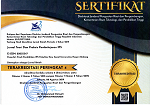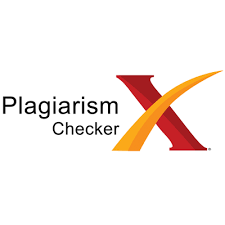Pembelajaran Sejarah di SMK era revolusi industri 4.0: tantangan dan peluang
Abstract
Vocational High Schools (VHS) are currently facing challenges in the era of Industrial Revolution 4.0, this is responded by the government by issuing one of the regulations, namely Peraturan Dirjen Dikdasmen No. 07/D.D5/KK/2018 which changes the curriculum structure in VHS. One of the subjects affected is Sejarah Indonesia which currently only gets 3 hours in class X. Though history is important to learn for show its identity as a nation. The purpose of this study is to examine the challenges and opportunities that faced on history learning in VHS at the era of Industrial Revolution 4.0, so that the application of history learning becomes effective and efficient. This study uses qualitative method by conducting interviews with four teachers and documents study about regulations of curriculum and reviewing other studies. The results found that teachers can use technology in learning, such as Whatsapp, Instagram, Edmodo, Prezi, documentary films, and visit local cultural heritage sites and museums as a media and source of history learning, so that can also be delivered effectively and efficiently. Finally, the goal of history learning to show its identity as a nation and also the integration of Indonesian nation can remain in the midst at the era of Industrial Revolution 4.0.
Keywords
Full Text:
PDFReferences
Badan Pusat Statistik (2018) Keadaan Ketenagakerjaan di Indonesia 2018. Jakarta.
Bayu Kurniawan, Idris, Agus Purnomo, Agung Wiradimadja, S. (2019) ‘Using Broadcasting Learning Design to Enhance Student’s Experiential Skill - Learning & Technology Library (LearnTechLib)’, International Association of Online Engineering, Kassel, Germany, pp. 172–180. Available at: https://www.learntechlib.org/p/210531/ (Accessed: 29 October 2019).
Cahyono, Y. D. (2015) ‘E-Learning (Edmodo) sebagai Media Pembelajaran Sejarah’, Jurnal Penelitian, 18(2), pp. 102–112.
Ghufron, M. A. (2018) ‘Revolusi industri 4.0: Tantangan, Peluang dan Solusi Bagi Dunia Pendidikan’, in Seminar Nasional dan Diskusi Panel Multidisiplin Hasil Penelitian dan Pengabdian kepada Masyarakat, pp. 332–337.
Gunawan, R. (2016) ‘Menjaga Integrasi Nasional dari Ancaman Dalam dan Luar Negeri melalui Pendidikan Sejarah’, in Seminar Nasional dan Kongres Hispisi 2016. Jakarta: Universitas Negeri Jakarta, pp. 232–250.
Kartikawati, S. and Pratama, H. (2017) ‘Pengaruh Penggunaan WhatsApp Messenger Sebagai Mobile Learning Terintegrasi Metode Group Investigation Terhadap Kemampuan Berpikir Kritis’, Jupiter (Jurnal Pendidikan Teknik Elektro), 2(2), pp. 33–38. doi: 10.25273/jupiter.v2i2.1797.
Maulana Yusuf; Ibrahim, N. K. (2018) ‘Pemanfaatan Museum sebagai Sumber Belajar dalam Pembelajaran Sejarah’, Visipena, 9(2), pp. 215–235.
Naredi, H. (2016) ‘Membangun Karakter dan Jatidiri Bangsa Indonesia Melalui Pendidikan Sejarah’, in Seminar Nasional Pendidikan Ilmu-Ilmu Sosial Membentuk Karakter Bangsa dalam Rangka Daya Saing Global. Makassar: Universitas Negeri Makassar dan Himpunan Sarjana Pendidikan Ilmu-Ilmu Sosial Indonesia, pp. 355–364.
Naredi, H., Qodariah, L. and Andi (2018) ‘Pengenalan Museum Sebagai Informasi Kesejarahan Dalam Meningkatkan Kesadaran Sejarah’, in Prosiding Kolokium Doktor dan Seminar Hasil Penelitian Hibah. Jakarta: Universitas Muhammadiyah Prof. DR. HAMKA, pp. 165–176. doi: https://doi.org/10.22236/psd/11165-17669.
Prananda, M. N., Sarkadi, S. and Ibrahim, N. (2018) ‘Efektivitas Sumber Pembelajaran Sejarah’, Jurnal Pendidikan Sejarah, 7(2), pp. 67–84. doi: 10.21009/jps.072.04.
Purnomo, A., Kurniawan, B. and Aristin, N. (2019) ‘Motivation to Learn Independently through Blended Learning’, in th International Conference on Educational Research and Innovation (ICERI 2018). Yogyakarta: Atlantis Press. doi: 10.2991/iceri-18.2019.55.
Saputri, I. J., Irafahmi, D. T. and Sumadi, S. (2016) ‘Media Presentasi Prezi Pada Mata Pelajaran Akuntansi Untuk Meningkatkan Motivasi Belajar Siswa’, Journal of Accounting and Business Education, 2(4). doi: 10.26675/jabe.v2i4.6075.
Sugiyono (2015) Metode Penelitian Pendidikan (Pendekatan Kuantitatif, Kualitatif, dan R&D). Bandung: Alfabeta.
Suswandari; Absor, N. F. (2018) ‘The 21st Century of History Learning’, in The 3 rd International Seminar on Social Studies and History Education (ISSSHE) 2018. Bandung: Universitas Pendidikan Indonesia, pp. 84–90.
Suswandari, S. (2017) ‘Ternate Historical Site as an Object Based Education for Sustainable Development’, JETL (Journal Of Education, Teaching and Learning), 2(2), pp. 151–163. doi: 10.26737/jetl.v2i2.279.
Utami, R. P., Probosari, R. M. and Fatmawati, U. M. I. (2015) ‘Pengaruh Model Pembelajaran Project Based Learning Berbantu Instagram Terhadap Kemampuan Berpikir Kreatif Siswa Kelas X SMA Negeri 8 Surakarta The Effect of Project-Based Learning Models by Instagram Toward Creative Thingking of The Tenth Grade Students A’, Jurnal Bio-Pedagogi, 4(1), pp. 47–52.
Wirawan (2016) Evaluasi: Teori, Model, Metodologi, Standar, Aplikasi dan Profesi. Jakarta: Rajawali Pers.
Refbacks
- There are currently no refbacks.
Editorial and Administration Office:
This Journal is published by Prodi Pendidikan IPS, Fakultas Ilmu Sosial, Universitas Negeri Malang
Semarang St. No. 5 Building I3-102 65145.
Phone. (0341) 551312. line. 376 (19)
Homepage: http://journal2.um.ac.id/index.php/jtppips/index
email: jtp2ips.journal@um.ac.id
JTP2IPS INDEXED BY:
e-ISSN 2503-5347
ISSN 2503-1201
JTP2IPS is licensed by CC BY 4.0.










